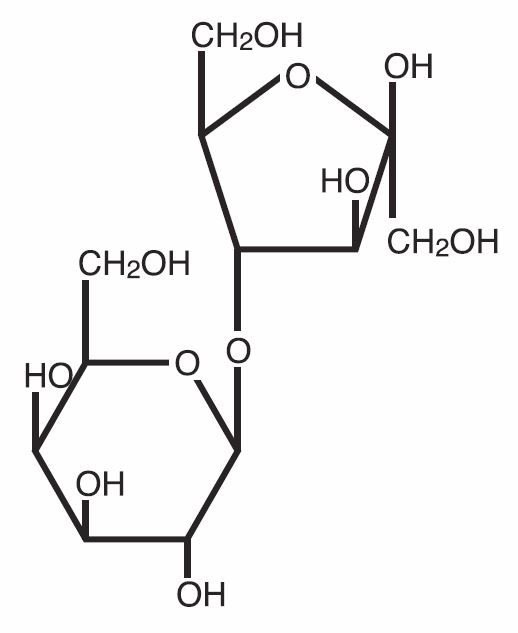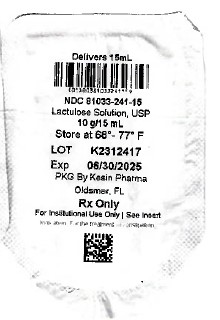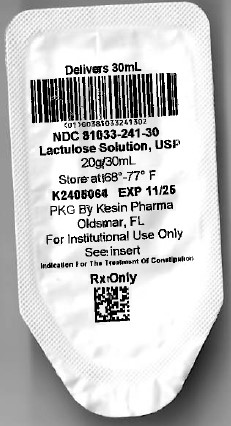LACTULOSE SOLUTION- lactulose solution usp, 10 g/15 ml solution
Lactulose Solution by
Drug Labeling and Warnings
Lactulose Solution by is a Prescription medication manufactured, distributed, or labeled by Kesin Pharma Corporation. Drug facts, warnings, and ingredients follow.
Drug Details [pdf]
-
HIGHLIGHTS OF PRESCRIBING INFORMATION
"These highlights do not include all the information needed to use" "see full prescribing information for" and "Initial U.S. Approval" Lactulose Solution USP, 10 g/15 mL
RECENT MAJOR CHANGES
DESCRIPTION 10/2024
INDICATIONS AND USAGE 10/2024
HOW SUPPLIED 10/2024
Revised: 4/2024
-
Table of Contents
FULL PRESCRIBING INFORMATION: CONTENTS*
DESCRIPTION
CLINICAL PHARMACOLOGY
INDICATIONS AND USAGE
CONTRAINDICATIONS
WARNINGS
PRECAUTIONS
Drug Interactions
Carcinogenesis, Mutagenesis, and Impairment of Fertility
Pregnancy: Teratogenic Effects; Pregnancy Category B.
Nursing Mothers
Pediatric Use
ADVERSE REACTIONS
OVERDOSAGE
DOSAGE AND ADMINISTRATION
HOW SUPPLIED
- * Sections or subsections omitted from the full prescribing information are not listed.
-
DESCRIPTION
Lactulose is a synthetic disaccharide in solution form for oral administration. Each 15mL contains: Lactulose 10g (less than 1.6g galactose, less than 1.2g lactose, and 0.1g or less of fructose). It also contains D&C Yellow No. 10, FD & C Yellow No. 6 and Purified Water.
Lactulose is a colonic acidifier which promotes laxation.
The chemical name for lactulose is 4-0-ß-D-galactopyranos-D-fructofuranose. It has the following structural formula:
The molecular weight is 342.30. It is freely soluble in water.
-
CLINICAL PHARMACOLOGY
Lactulose is poorly absorbed from the gastrointestinal tract, and no enzyme capable of hydrolysis of this disaccharide is present in human gastrointestinal tissue. As a result, oral doses of lactulose solution reach the colon virtually unchanged. In the colon, lactulose is broken down primarily to lactic acid, and also to small amounts of formic and acetic acids, by the action of colonic bacteria, which results in an increase in osmotic pressure and slight acidification of the colonic contents. This in turn causes an increase in stool water content and softens the stool.
Since lactulose does not exert its effect until it reaches the colon, and since transit time through the colon may be slow, 24 to 48 hours may be required to produce the desired bowel movement.
Lactulose solution given orally to man and experimental animals resulted in only small amounts reaching the blood.
Urinary excretion has been determined to be 3% or less and is essentially complete within 24 hours. - INDICATIONS AND USAGE
- CONTRAINDICATIONS
-
WARNINGS
A theoretical hazard may exist for patients being treated with lactulose solution who may be required to undergo electrocautery procedures during proctoscopy or colonoscopy. Accumulation of H 2 gas in significant concentration in the presence of an electrical spark may result in an explosive reaction. Although this complication has not been reported with lactulose, patients on lactulose therapy undergoing such procedures should have a thorough bowel cleansing with a non-fermentable solution. Insufflation of CO 2 as an additional safeguard may be pursued but is considered to be a redundant measure.
-
PRECAUTIONS
General
Since lactulose solution contains galactose (less than1.6 g/15 mL) and lactose (less than 1.2 g/15 mL), it should be used with caution in diabetics. Infants receiving lactulose may develop hyponatremia and dehydration.Drug Interactions
There have been conflicting reports about the concomitant use of neomycin and lactulose solution. Theoretically, the elimination of certain colonic bacteria by neomycin and possibly other anti-infective agents may interfere with the desired degradation of lactulose and thus prevent the acidification of colonic contents. Thus the status of the lactulose-treated patient should be closely monitored in the event of concomitant oral anti-infective therapy.
Results of preliminary studies in humans and rats suggest that nonabsorbable antacids given concurrently with lactulose may inhibit the desired lactulose-induced drop in colonic pH. Therefore, a possible lack of desired effect of treatment should be taken into consideration before such drugs are given concomitantly with lactulose.Carcinogenesis, Mutagenesis, and Impairment of Fertility
There are no known human data on log-term potential for carcinogenicity, mutagenicity, or impairment of fertility.
There are no known animal data on long-term potential for mutagenicity.
Administration of lactulose solution in the diet of mice for 18 months in concentrations of 3 and 10 percent (v/w) did not produce any evidence of carcinogenicity.
In studies of mice, rats, and rabbits, doses of lactulose solution up to 6 or 12 mL/kg/day produced no deleterious effects in breeding, conception, or parturition.Pregnancy: Teratogenic Effects; Pregnancy Category B.
Reproduction studies have been performed in mice, rats, and rabbits at doses up to 2 or 4 times the usual human oral dose and have revealed no evidence of impaired fertility or harm to the fetus due to lactulose. There are, however, no adequate and well-controlled studies in pregnant women. Because animal reproduction studies are not always predictive of human response, this drug should be used during pregnancy only if clearly needed.
-
ADVERSE REACTIONS
Precise frequency data are not available. Lactulose may produce gaseous distention with flatulence or belching and abdominal discomfort such as cramping in about 20% of patients. Excessive dosage can lead to diarrhea with potential complications such as loss of fluids, hypokalemia, and hypernatremia. Nausea and vomiting have been reported.
To report SUSPECTED ADVERSE REACTIONS, contact Kesin Pharma at 1-833-537-4679 or FDA at 1-800-FDA-1088 or www.fda.gov/medwatch. -
OVERDOSAGE
Signs and Symptoms
There have been no reports of accidental overdosage. In the event of overdosage, it is expected that diarrhea and abdominal cramps would be the major symptoms. Medication should be terminated.
Oral LD 50
The acute oral LD 50 of the drug is 48.8 mL/kg in mice and greater than 30 mL/kg in rats.
DialysisDialysis data are not available for lactulose. Its molecular similarity to sucrose, however, would suggest that it should be dialyzable.
-
DOSAGE AND ADMINISTRATION
Adult
The usual adult oral dosage is 2 to 3 tablespoonfuls (30 to 45 mL, containing 20 g to 30 g of lactulose) three or four times daily. The dosage may be adjusted every day or two to produce 2 or 3 soft stools daily.Pediatric
Very little information on the use of lactulose in young children and adolescents has been recorded. As with adults, the subjective goal in proper treatment is to produce 2 to 3 soft stools daily. On the basis of information available, the recommended initial daily oral dose in infants is 2.5 to 10 mL in divided doses. For older children and adolescents, the total daily dose is 40 to 90 mL. If the initial dose causes diarrhea, the dose should be reduced immediately. If diarrhea persists, lactulose should be discontinued.
Note: Some patients have found that lactulose solution may be more acceptable when mixed with fruit juice, water or milk. -
HOW SUPPLIED
Lactulose Solution, USP, 10 g/15 mL is a clear, yellow to golden-yellow solution supplied as follows:
NDC: 81033-241-15 - 15 mL Unit Dose Cup
NDC: 81033-241-50 - Case containing 100 (15mL unit dose cups)
NDC: 81033-241-30 - 30 mL Unit Dose Cup
NDC: 81033-241-51 - Case containing 100 (30mL unit dose cups) -
STORAGE
Store at 20° to 25°C (68° to 77°F) [See USP Controlled Room Temperature]. Do not freeze. Keep tightly closed.
Under recommended storage conditions, a normal darkening of color may occur. Such darkening is characteristic of sugar solutions and does not affect therapeutic action.Prolonged exposure to temperatures above 86°F (30°C) or to direct light may cause extreme darkening and turbidity which may be pharmaceutically objectionable. If this condition develops, do not use. Prolonged exposure to freezing temperatures may cause change to a semisolid, too viscous to pour. Viscosity will return to normal upon warming to room temperature.
Dispense in a tight, light-resistant container as defined in the USP, with a child-resistant closure.Packaged by:
Kesin Pharma
Oldsmar FL, 34677
PI Rev. 10/2024
-
PRINCIPAL DISPLAY PANEL
Delivers 15ml
NDC: 81033-241-15
LACTULOSE SOLUTION, USP 10 g/15 mL
FOR ORAL OR RECTAL ADMINISTRATION
Store at 20-25°C (68-77°F)
PKG By Kesin Pharma
Oldsmar, FL
Rx Only
For Institutional Use Only| See Insert

Delivers 30ml
NDC: 81033-241-30
LACTULOSE SOLUTION, USP 20 g/35 mL
FOR ORAL OR RECTAL ADMINISTRATION
Store at 20-25°C (68-77°F)
PKG By Kesin Pharma
Oldsmar, FL
Rx Only
For Institutional Use Only
See Insert

-
INGREDIENTS AND APPEARANCE
LACTULOSE SOLUTION
lactulose solution usp, 10 g/15 ml solutionProduct Information Product Type HUMAN PRESCRIPTION DRUG Item Code (Source) NDC: 81033-241(NDC:61037-471) Route of Administration ORAL, RECTAL Active Ingredient/Active Moiety Ingredient Name Basis of Strength Strength LACTULOSE (UNII: 9U7D5QH5AE) (LACTULOSE - UNII:9U7D5QH5AE) LACTULOSE 10 g in 15 mL Inactive Ingredients Ingredient Name Strength FD&C YELLOW NO. 6 (UNII: H77VEI93A8) D&C YELLOW NO. 10 (UNII: 35SW5USQ3G) WATER (UNII: 059QF0KO0R) Product Characteristics Color yellow (Yellow to Golden Yellow) Score Shape Size Flavor Imprint Code Contains Packaging # Item Code Package Description Marketing Start Date Marketing End Date 1 NDC: 81033-241-50 100 in 1 CASE 04/16/2024 1 NDC: 81033-241-15 15 mL in 1 CUP, UNIT-DOSE; Type 0: Not a Combination Product 2 NDC: 81033-241-51 100 in 1 CASE 04/16/2024 2 NDC: 81033-241-30 30 mL in 1 CUP, UNIT-DOSE; Type 0: Not a Combination Product Marketing Information Marketing Category Application Number or Monograph Citation Marketing Start Date Marketing End Date ANDA ANDA076645 04/16/2021 Labeler - Kesin Pharma Corporation (117447816) Establishment Name Address ID/FEI Business Operations Kesin Pharma Corporation 117447816 repack(81033-241)
© 2026 FDA.report
This site is not affiliated with or endorsed by the FDA.